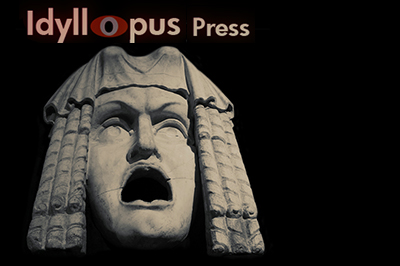STANLEY KUBRICK'S FEAR AND DESIRE

Go to TOC for this film ( (which has also a statement on purpose and manner of analysis and a disclaimer as to caveat emptor and my knowing anything authoritatively, which I do not, but I do try to not know earnestly, with some discretion, and considerable thought).
DAY THREE
TOC and Supplemental Posts | Part 1 | Part 2 | Part 3 | Films Home
Links to sections of the analysis on this page:
What Are You Living for Anyway: Shots 475 through 538
Notes on What Are You Living for Anyway: Mac's belief in the serendipitous and synchronous now drives the story. The two versions of this scene. CU shots of Corby digging in the pine straw.
Sneak Attack by Water and Land Shots 539 through 648
Notes on Sneak Attack by Water and Land: Kubrick's interest in doubles (Corby/the General and Fletcher/the Captain) already previously expressed in Day of the Fight. The realization of the mouse-trap map for the General. Why might Kubrick not have wanted this film to be seen. Kubrick's affirmation, in a latter, on the doubling in Fear and Desire, the confrontation with a deadly enemy made from almost the same mold as one. The cannibals as Caliban's doubles. Heart of Darkness. Proteus expressing the protean nature of all the characters. The extinguishing of the front fill light when the general is shot. The plane and the seeming halo effect.
Sidney in the River Shots 649 through 662.
Notes for Sidney in the River: The noises in the air as conjured by Ariel, and the sleep of Caliban. Maya and the state beyond illusion. The encouragement to keep one's eyes open and see what's really there, as in Eyes Wide Shut. Sidney's loss of his wallet, and Bill's loss of his wallet in Eyes Wide Shut. Prospero's speech after the masque in The Tempest
Conclusion by the River Shots 663 through 676
Notes on the Conclusion: Ariel's final song. Closing with a return to the beginning.
How the Film Was Sold as Opposed What It Actually Is
WHAT ARE YOU LIVING FOR ANYWAY
475 The river again. As in shots 99 and 244.
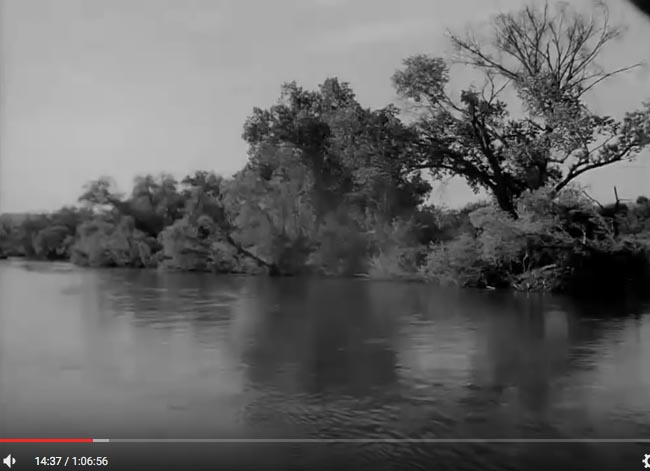
476 MS Fletcher, Mac and Corby resting in the forest.
CORBY: Kill him.
MAC:
Yeah.
CORBY:
No, I won't hear anymore about it. I don't know what's gotten into you, Mac. So you saw a General. So what? Raft is all set. In a couple of hours we'll be on it.
MAC:
Raft! Raft, raft, raft!
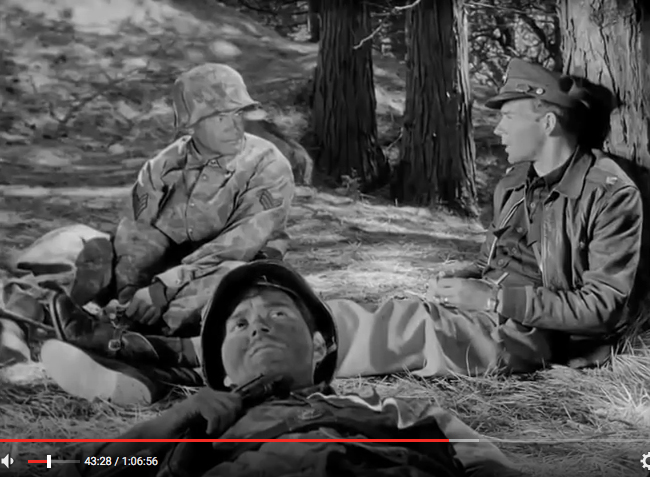
477 MS Mac breaks a stick and throws it, Corby resting against a tree beyond.
MAC: Can't you see any further? A General! Why, he...
CORBY:
How many times...
478 CU of Mac from the side.
CORBY (off screen): ....do I have to go over this? Must I tell you again?
479 Return to shot 477.
CORBY:
What's one of their Generals to me? He's cheap at my rate of exchange, but our lives aren't.
MAC (scoffing):
Your rate of exchange. You make me laugh!
480 Return to shot 476.
MAC: If you had any guts, you would...
CORBY: Look, I don't wanna talk about it anymore.
FLETCHER:
Forget about the General for a minute. What about the plane you saw?
481 Return to shot 479 of Mac and Corby beyond.
MAC: That's right! What about that plane?
CORBY:
We've already been over this.
482 CU of Corby's left hand, holding twig and digging in the pine straw.
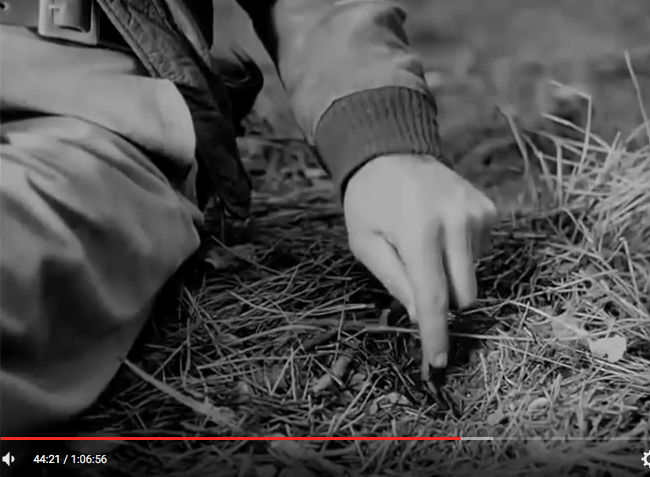
CORBY: It looks like a two seater, and with
that small field for me to clear...
483 MS from side of Corby with Mac beyond.
MAC: Look. One of us can take that raft downstream to the field when it gets dark and start shooting to draw the sentries from the house.
484 Return to shot 480 of the three men.
MAC:
The other two can plug that guy and get away in the plane, while I keep 'em busy
from the raft.
485 Return to shot of Mac from his right, Corby beyond.
CORBY:
You?
MAC: Sure, me.
CORBY:
They'd catch you. You'd never make it back alive.
MAC:
Who else could do it the way I could? You couldn't.
486 Return to shot 483 of Corby from the side with Mac beyond.
MAC:
You'd be right at home, sitting down nice and comfortable up in a cockpit, looking down on what's going on. Sure. you'll recite a few sayings you picked up and everything will be alright. I'd just as soon make the trip back myself...
487 Return to shot 485 of Mac from his right, Corby beyond.
MAC: ...on a raft.
CORBY:
Do you think you'd have any chance at all to get away with it alive?
MAC:
I don't know.
488 CU of Corby.
MAC (off screen):
Here I am. I'm 34 years old.
489 CU of Mac.
MAC:
I've never done anything important. Nothing! When this is over I'll fix
radios and washing machines.
490 CU of Corby.
MAC (off screen):
They'll say, good boy, Mac. That's all.
491 Return to CU of Mac as in shot 489.
MAC:
I don't care if they got a million Generals. There's one two miles from here. If his hide's gonna keep me from going nuts, like Sidney, only in a different way,
I'm gonna put up my own...
492 CU of Corby.
MAC: ...hide.
CORBY:
But why should we? The raft's still there. As soon as it gets dark, it can take
us all back tonight.
493 CU of Fletcher turning over, interested.
494 Return to shot of Corby from the side with Mac beyond.
MAC: Look. If I draw 'em down to the river, you and Fletcher can do the job and get away in a plane. What do you say...
495 Return to CU of Fletcher as in shot 493.
MAC: ...Fletch? Well, it's not that I wanna seem important. Half the trouble in the world happens because some people...
496 CU of Mac from his left.
FLETCHER (off screen):
...do. But I think half the good things happen that way, too.
497 Return to CU of Fletcher.
FLETCHER: If we could get away with it, it would sure be...
498 Return to MS of Corby from the side with Mac beyond.
FLETCHER (off screen): ...better.
MAC: I don't know the words to say what I mean, but, this is something for me.
Something. Sure, I...
499 CU of Corby.
MAC (off screen): ...I guess we could all probably make
it back on that...
500 Return to CU of Corby's hand digging in the pine straw with a stick, as in shot 482.
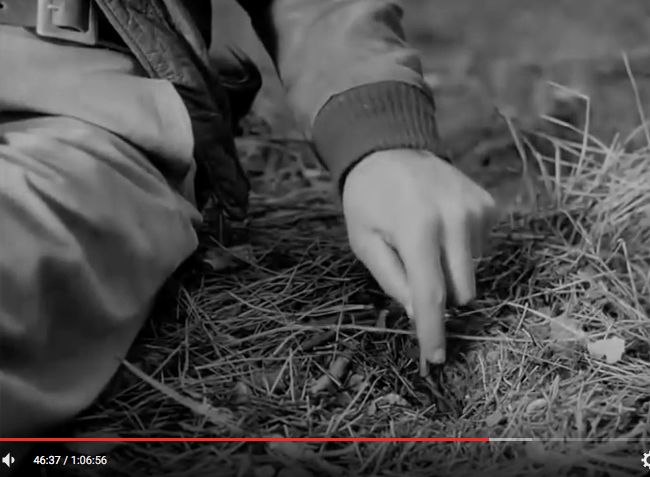
MAC: ...thing, but...
501 Return to CU of Fletcher.
Mac: ...when you walk and walk through the woods and...
502 Return to shot of Corby from the side with Fletcher beyond.
MAC: ...then suddenly they dangle a General in front of you like magic,
and you know it's only for this once.
503 MCU of Corby.
MAC (off screen): You can't turn your back on 'em. None of us asked to be here, but we all have to gamble. It's not as if...
504 CU of Fletcher.
MAC: ...we could refuse. We had to gamble...
505 MCU of Corby.
MAC: ...once we crashed.
506 Return to CU of Corby's hand digging in the pine straw with a stick, as in shot 500.
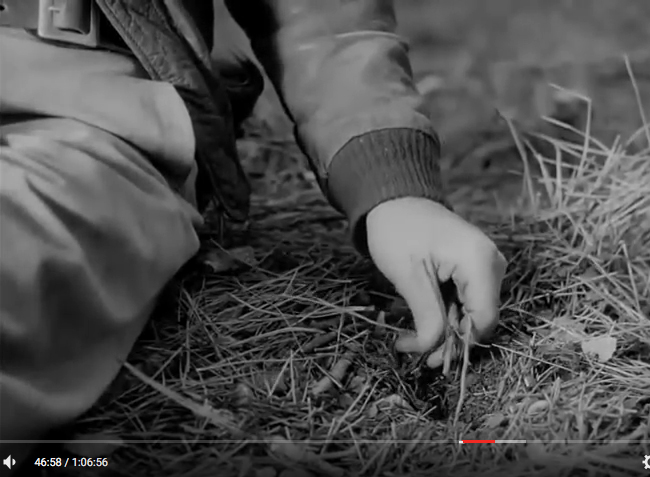
MAC: That General raised the stakes and we've been so lucky.
507 Return to MCU of Corby.
MAC:
Why shouldn't we put up a little more than we have to?
508 Return to Corby from the side with Mac beyond.
MAC: What are you living for anyway? To make talk? Why? Why is your life so precious?
509 Return to MCU of Corby.
MAC: Why? Can you tell me why?
CORBY (thinking): Why? They always corner me with that why. If I knew a decent answer to it, I'd shout it, publish it, write it on walls with chalk.
510 CU of Mac.
MAC: Do it for me.
511 MCU of Corby.
512 Return to CU of Corby's hand digging in the pine straw with a stick, as in shot 506.
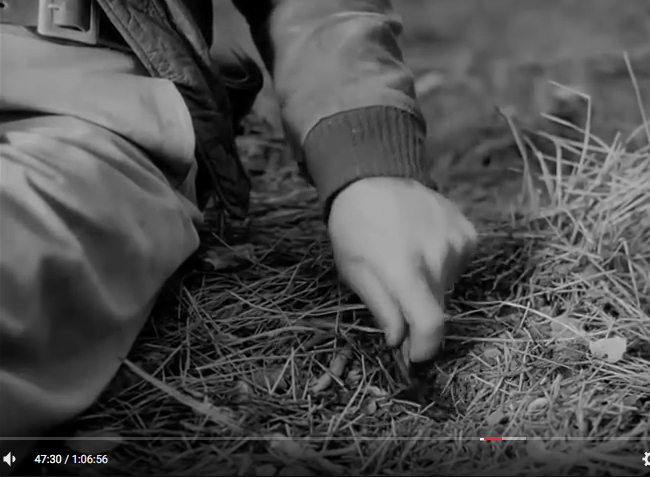
513 Extreme CU of Mac.
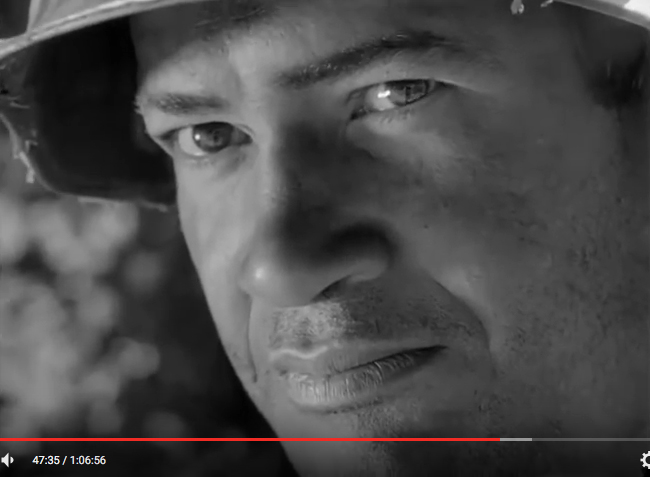
514 Return to CU of Corby from the front.
CORBY: Well, we have nothing to lose but our futures.
There are two versions of the end of this conversation. An earlier pre-restoration version has:
MAC: Why? Why's your life so precious?
CORBY: Why? The only reason is to hunt for the reason. But, can I stand in the way of a man with a reason to die?
MAC: You'll do it. Won't you, Corby? Do it for me.
CORBY:
Well, we have nothing to lose
but our futures.
515 Return to side view of Corby, Mac beyond.
516 CU of Corby looking at Mac.
517 Return to side view of Corby, Mac beyond.
518 Return to extreme CU of Mac. Fade to black.
519 LS the raft in the water with Fletcher and mac, Corby climbing down from the bank to it.
CORBY:
OK, I guess we'll leave you now.
520 MS Corby from his left.
CORBY:
Remember, don't start for a half an hour.
521 MCU of Mac.
CORBY (off screen):
If the plane isn't still there, we'll have time to get back to you.
MAC:
Don't worry, it'll be there.
522 Return to shot 519.
523 Return to shot of Mac, panning over to his grasping Fletcher's hand.
FLETCHER: Good luck, Mac. See you soon.
524 Return to shot 522 of the 3 by the raft.
FLETCHER:
Try not to get your feet wet.
525 MCU from Mac's right.
MAC: You look out for your head.
526 MS of Corby.
FLETCHER (off screen): OK, fellow.
527 Return to 525 of Mac.
MAC:
So long.
528 Return to 526 of Corby.
CORBY: Mac, I hope that sometime...
MAC:
You talk too much. I guess we both do a little.
529 Extreme CU of Fletcher.
CORBY: Sometimes, talk is an indispensable medicine.
530 Return to 527 shot of Mac.
MAC:
Yeah, but you get sicker later.
531 Return to 527 shot of Corby.
532 Return to 530 shot of Mac.
533 Return to 531 shot of Corby.
MAC:
Good luck.
534 Return to 532 shot of Mac.
MAC:
I didn't really mean what I said before about guts.
535 Return to 533 shot of Corby.
CORBY:
Yes, you did, but don't let it bother you.
536 Return to 534 shot of Mac.
537 Return to shot of all 3 by the raft as in 524.
FLETCHER:
Take it easy, fellow.
Fletcher and Corby climb ashore. Crossfade.
538 LS of Corby and Fletcher running through woods. Swipe to...
WHAT ARE YOU LIVING FOR ANYWAY: THINGS TO NOTE
Mac's belief in the serendipitous and synchronous now drives the story
After the chaos of Sidney and the woman, we return to the main story, which has now clearly evolved from just getting home to the conflict between just getting home and Mac wanting to give his life heroic purpose, which means convincing the others that there is meaning in their lost souls being so close to an enemy General. He wants an opportunity to distinguish himself, if only for himself, for his own sake, providing him a meaning for having existed, which will mean offering himself up as a decoy. He doesn't even propose himself as being the one to kill the General. He will only be part of a plan that will gain others that opportunity. He later ruminates on how no one will give him glory, and it's okay. He believes they are serendipitously where they are so that, as soldiers, they can make a difference, and as we later learn that difference has to do with removing from the world an individual whose purpose in life has become the creation of slaughter, who professes being so accustomed to war that peace is a disappointment. Who feels trapped. Who seems to be longing for death to find him.
Thank god Frank Silvera was in this movie. Kenneth Harp is just awful. The man just can't act. At all.
The two versions of this scene
I've seen two versions of this scene.
One version has:
508
MAC: ...Why is your life so precious?
509
CORBY: Why? They always corner me with that why. If I knew a decent answer to it, I'd shout it, publish it, write it on walls with chalk.
510
MAC: Do it for me.
511-513 no dialogue
514
CORBY: Well, we have nothing to lose but our futures.
An earlier pre-restoration version(?) has:
508
MAC: ...Why's your life so precious?
509
CORBY: Why? The only reason is to hunt for the reason. But can I stand in the way of a man with a reason to die?
510
MAC: You'll do it. Won't you, Corby? Do it for me.
511-513 no dialogue
514
CORBY: Well, we have nothing to lose but our futures.
Corby, in shot 509, has an entirely different line.
CU shots of Corby digging in the pine straw
What distinguishes as Kubrickian in this scene is the young Kubrick focusing in 4 times on Corby's hand idly digging a twig through the pine straw and into the dirt. You know someone said, "Why, Stanley? Why? We don't really need to show that four times, do we? What does it add?" For young Kubrick it added something that he later decided never needed to be shown in that way again because he never did it again.
Kubrick works in circularities and within the large circularity (the film begins and ends on the same shot) we have minor circularities and repetitions. For instance, we have the same shot of the river being viewed three times, in shots 99, 244 and 475.
Perhaps Kubrick intended the digging in the straw to fold in another circularity (there are others). I don't know. Perhaps he intended to take us back to the stick marking the mousetrap diagram of 25 thru 27. I don't know. But repeatedly showing the digging in the pine straw, a CU of Corby's hand from the same angle, simply doesn't work. It's disruptive in a wrong way. I put myself mentally in front of that editing console and imagine myself splicing that twig digging hand close-up four times. It's not an accident. It holds purpose for the young Kubrick, but it is clumsy.
If we look at the one line of dialogue in this scene that for some reason was redone (and I don't know which version was first) it seems there may be a tie-in with Corby digging in the pine straw with the stick. In one version he meditates on Mac's "why is your life so precious" voiced in response to Corby's reluctance to take on the General's compound. In the other version, considering the preciousness of life, he considers if he knew the answer he'd "publish it, write it on walls with chalk", which may or may not speak to Corby's digging in the pine straw with the stick. Perhaps it was intended to represent writing? Again, I don't know.
SNEAK ATTACK BY WATER AND LAND
539 MS of Corby and Fletcher, Corby looking through his binoculars.
540 Pan shot of airplane.
541 Return to shot 539.
CORBY:
The plane's still there so I guess there's no really good excuse to go back.
FLETCHER:
I guess not.
542 MCU of General viewed through window.
FLETCHER:
Can you see?
CORBY: Hold it, hold it! Yes, there he is.
543 Return to shot 541 of Corby and Fletcher.
FLETCHER:
What time is it?
CORBY:
We have about 10 minutes before Mac begins. Let's hurry!
They exit screen right.
544 LS of Mac floating down the river on the raft.
MAC (thinking): Ah, it's better...
545 MLS of Mac on the raft.
MAC:
It's better to roll up your life into one night and one man and one gun.
It hurts too much to keep hurting everyone else in every direction and to be hurt with all
the separate hates exploding day after day.
You can't help it. A curse buzzes out of your mouth with every word you say...
546 MS of Mac from the front.
MAC:
...and nobody alive can tell...
547 Shot of riverbank.
MAC (thinking): ...which is which
or what you mean. Yeah. You try door after door when you hear voices you like behind them.
548 MCU of Mac.
MAC: But the knobs come off in your hand.
549 LS of Corby and Mac running through the woods toward the camera then left, the camera panning to follow them.
550 Exterior of the General's house. Two sentries guard the door. Two sentries pace.
551 MS of the General with his head on a table. There's a knock on the door and he raises his head, which is when we see the General is played by the same actor who plays Corby.
GENERAL: Come in.
552 MS of feet of person advancing with the same dog seen on the first day.
GENERAL: Ah, where did you find him?
CAPTAIN (played by same individual who plays Fletcher):
One of the men did down by the river. He was very busy baying at the moon.
553 CU of the Captain, who we now see is the man who played Fletcher.
GENERAL: There, Proteus, aren't you ashamed of yourself? Staying away without leave...
554 MCU of dog held on chain by the general.
GENERAL: ...for two whole days. An officer should know how to control himself better.
Pets the dog.
555 CU of the general.
GENERAL: Have a drink, Captain.
CAPTAIN: Yes, sir. Thank you, sir.
GENERAL: You must never, ever do that again, Proteus. Don't you know that there are
evil spirits without bodies who ...
556 CU of the captain drinking.
GENERAL: ...roam the forest looking for unsuspecting dogs like you?
557 MCU of the general with the dog.
GENERAL:
And that when you open your jaws to disturb the moon, why, they leap into your mouth
and possess you? Then you could become a spy,
a murderer, or even a traitor.
558 CU The captain's hands pouring another drink, some spilling on maps on the table below.
CAPTAIN:
Not your dog, sir. He knows his allegiance.
GENERAL: Have you been alert, Proteus?
559 CU of the dog.
GENERAL:
Have you detected all the distant marchings? Has your wet nose been aware of all the blood on the grass? What else can you tell us beside your puppy dog sadness?
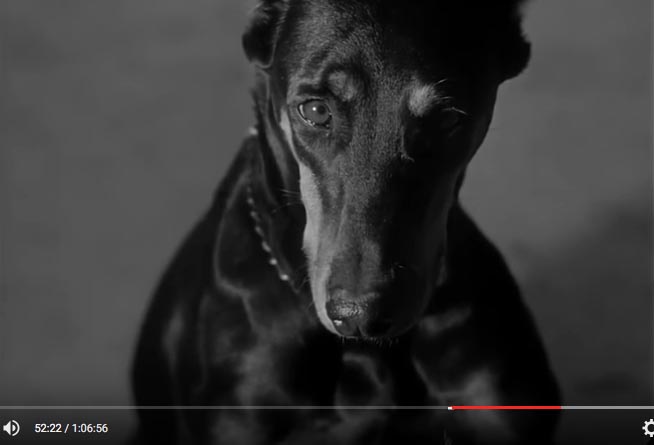
560 MS The general from behind the captain's head.
CAPTAIN: I wish he could tell us where those enemy soldiers from that wrecked plane...
561 CU of the dog as in 559.
CAPTAIN: ...are. They've been...
562 Return to shot 560.
CAPTAIN: ...bothersome for the last two days.
GENERAL:
They'll soon grow tired of starving and being hunted. Even Proteus grows tired of it
after two days. See that Lieutenant Proteus gets something to eat.
CAPTAIN (rising): Yes, sir.
563 MS Mac poling down the river.
MAC (thinking): Nobody's gonna cry for me later or cheer for me now.
Nobody else is me. I know that. Who else but me is buried under the chain of everything I ever did? I didn't mean any of it. It was all wrong.
564 The riverbank.
MAC: Good riddance. Oh, what a trade. Him for me!
565 CU of Mac.
MAC:
What a thing to come to at the end, like building a bridge or stealing the crown jewels.
Thanks, General! (Laughs.) Thanks! I'll take the tombstone, if it's really mine.
566 LS of Corby and Fletcher progressing through the woods.
567 MS from the side of General-Corby, Captain-Fletcher beyond.
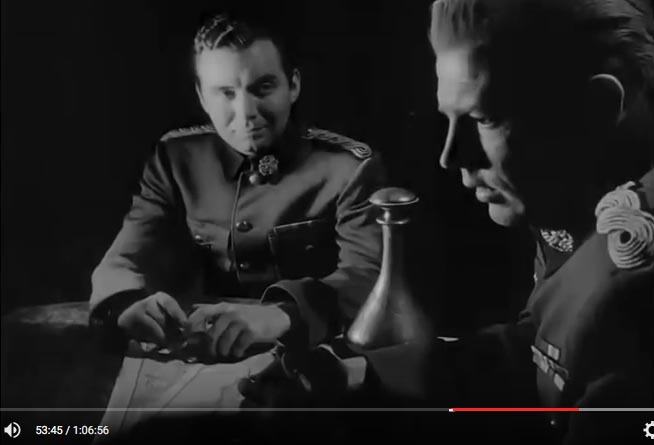
GENERAL: Waiting. Waiting to kill. Waiting to heal. Waiting to die. Away in the north with four divisions, one by one the men turned black
through waiting for the last snowflake to dissolve.
568 MCU of the general.
GENERAL:
Across the valley, our enemies blew on their cold hands until no more breath came. Then they were dead. And they knew it.
569 CU of Captain drinking.
GENERAL:
We were so well prepared for death that the armistice was a mutual disappointment.
570 Corby and Fletcher walking through the woods.
571 The trees hanging over the river.
MAC (thinking):
Now he's in his counting house, taking up the cartridges on his maps...
572 MCU of Mac.
MAC: ...full of his supper. Oh, they'll get him soon. A duck in his shooting gallery, and I'll be the wheeler rolling the ducks in all the bull's eyes.
I should talk. A clay pigeon on a slow raft.
573 CU of General in shadow, smoking.
GENERAL:
Frankly, I still become uneasy when I find myself trapped...
574 MCU of the captain.
GENERAL: ...directing the courses of frightened men.
575 General. Shot as in 563.
GENERAL: I cannot quite admit that it is I who am creating slaughter in this abyss, or that I left the road, or that I ordered this and that.
576 MCU of the captain.
GENERAL: I'm trapped. What is a prison for me? I make a grave for others.
CAPTAIN (drinking toast):
To your health, sir.
577 Corby and Fletcher making the way through the woods.
578 MCU of Mac on the raft.
MAC: Ah, it's the only way to finish up. Alone, like the North Pole
in the middle of the night.
579 MLS of Mac floating down the river.
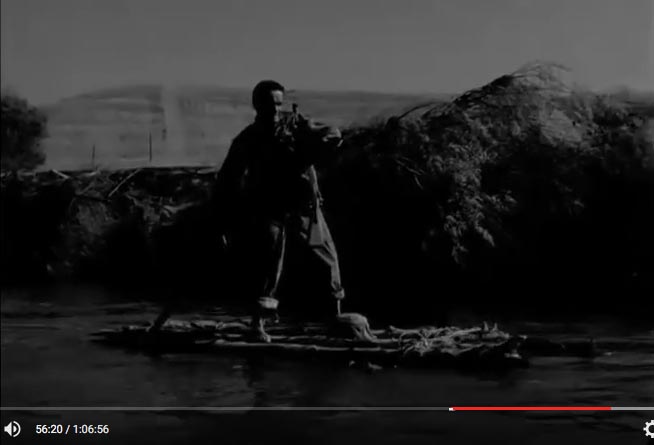
MAC:
The river is helping me out of my life.
580 MS of the general from over the captain's shoulder. Maps on the wall behind him and on his desk.
GENERAL: Sometimes, these maps...sometimes, as I look at these maps,
I wonder if my own grave isn't being planned. Here...or here...or here. (He looks up at the door.)
581 MS of Mac staking the raft in the river.
582 LS of the house in which is the general.
583 MCU of Mac.
584 Extreme CU of Mac.
MAC:
No more Sundays. No more a thousand things. I'm a little scared though. Just a little. like kissing my great grandma when she was dying.
585 MS of Corby and Fletcher kneeling with their weapons drawn. Corby checks his watch.
586 The exterior of the general's house with the sentries out front.
587 CU of the general, holding a drink.
588 Corby and Fletcher as in shot 585.
589 The sentries before the house, as in shot 586.
590 MS of Mac on the raft, raising his rifle.
591 CU of Mac.
MAC (yelling):
Come on out here, you bunch of half-witted cannibals!
592 MS as in shot 590 of Mac firing his rifle.
593 The sentries, turning and running to the river as the shots continue.
594 Shot of Corby and Fletcher as in shot 588.
595 LS of more sentries running around from the back of the house.
596 CU of the General, paying no attention to the shots.
597 MS of sentries grabbing guns and running.
598 Shot of Corby and Fletcher as in shot 594.
599 CU from side of the general with the captain beyond, listening, laconic.
600 Shot as of 592 of Mac firing his rifle. We hear return gunfire.
601 LS of soldiers firing from a grassy field.
602 Shot as of 600 of Mac firing the rifle. He's hit and falls.
603 Shot as of 601 of the soldiers firing.
604 Shot of Mac on the raft, kneeling.
605 The house, unguarded.
606 Corby and Fletcher as in shot 598.
607 LS of Corby and Fletcher making their way toward the house.
608 The house as in shot 605.
609 Corby and Fletcher running.
610 Corby and Fletcher approach the exterior of the house.
611 MLS of Corby and Fletcher. Fletcher runs to screen right.
612 Mac lying on the raft. He has quit firing his gun and is struggling.
613 Fletcher makes his way along the side of the house.
614 MS of Corby watching.
615 Fletcher beneath a window of the house.
616 CU of Corby watching.
617 Fletcher climbs up to another window.
618 From the side, the general with the captain beyond.
619 Fletcher raises his gun and fires.
620 MCU of the general from his right. A light is on his face but as the gun fires the light goes out and he rockets back out of his chair.

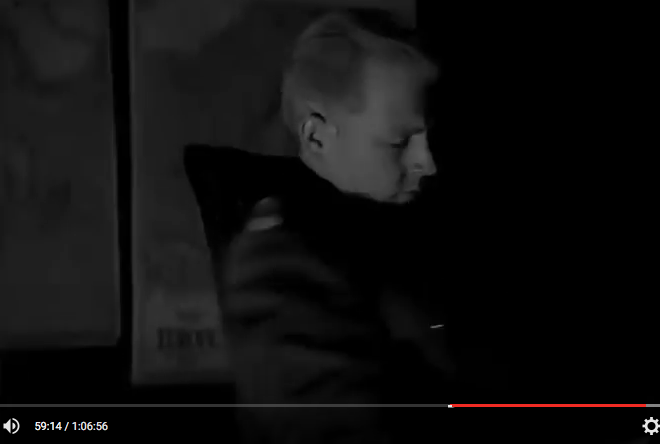
621 MCU of the captain looking up, immobile, then he too is shot out of his chair.
622 MS of the captain falling on the floor.
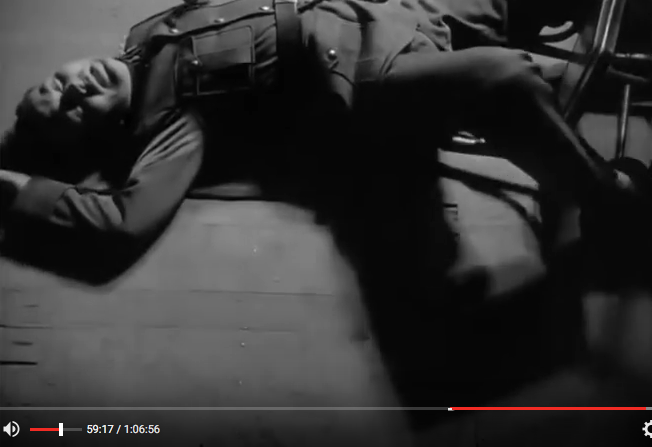
623 CU of the general's face. He turns over.
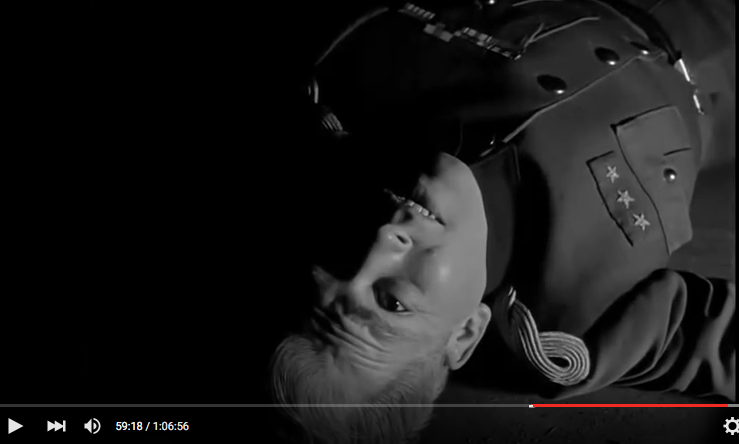
624 Fletcher running along the side of the house.
625 Fletcher runs up to Corby.
FLETCHER: I missed him! I think he's only wounded!
626 CU of the general crawling along the floor.
627 Fletcher and Corby.
CORBY: Come on. We have to finish him off.
FLETCHER:
But they stopped shooting at the river. They'll be here any minute.
628 CU The general crawling along the floor.
629 The porch of the house. A door opens, the general's hand reaches out. He begins to crawl out onto the porch.
630 Corby and Fletcher run toward the house.
631 CU The general raises himself up.
GENERAL:
I surrender!
632 CU of Corby. Sound of gunfire as he shoots the general.
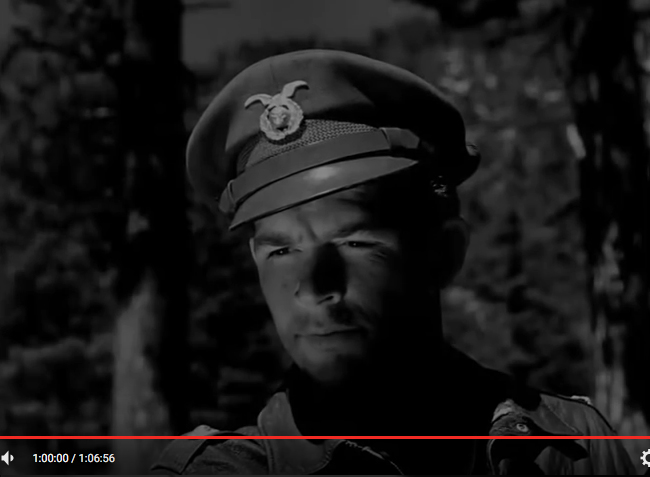
633 The general being thrown back by the shots.
634 The general falls, dead.
635 CU of Corby as in shot 632.
636 CU of the general's profile, head to the floor of the porch, as in shot 634.
637 CU of Corby as in shot 635. He turns away then looks back.
FLETCHER:
Come on, let's go!
638 The general as in shot 636.
639 Corby staring toward the porch, as in shot 637.
FLETCHER:
Please, please, we don't have any time.

640 The general, as in shot 638.
641 Corby turning away.
642 The general, as in shot 640.
643 LS of Corby and Fletcher running.
644 MS the porch door swinging open and the dog exiting and sniffing the general's legs.
645 LS of Fletcher and Corby running to the plane.
646 Side view of Fletcher and Corby running to the plane and entering.
647 MS the dog licking its snout. Sound of the plane taxiing.
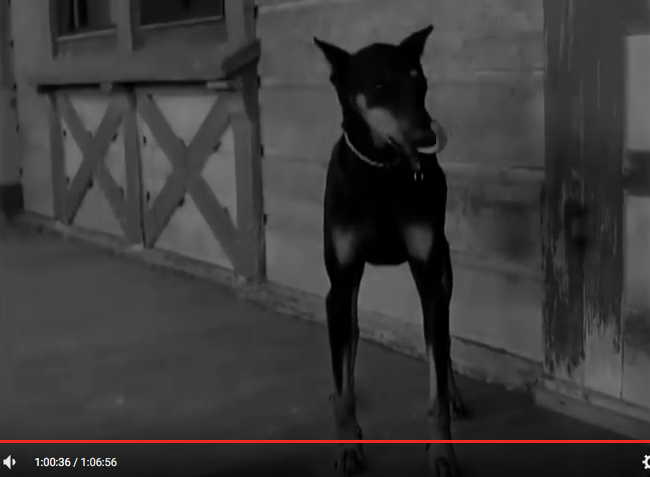
648 LS of the plane taking off. Fade to black.
SNEAK ATTACK BY WATER AND LAND: THINGS TO NOTE
Kubrick's interest in doubles (Corby/the General and Fletcher/the Captain) already previously expressed in Day of the Fight. The realization of the mouse-trap map for the General. Why might Kubrick not have wanted this film to be seen
IMDB gives as trivia that the reason Harp and Coit both play two roles in the film was because of a tight budget, but Kubrick was already working with doubles in his boxing short Day of the Fight and would continue to work with the idea of doubling throughout his career. In Day of the Fight one could say that doubling is birth happenstance, the subjects being twins, but the twins were what Kubrick chose for his documentary. Here, Kubrick has made his interest in doubles obvious, Corby seeing himself in the general, and Fletcher playing also the captain. With the killing of their doubles, they make it back to friendly territory, while Mac/Caliban, paired with Sidney/Ariel, drifts on their raft into even more surreal territory.
If there is any doubt whether the doubling was intentional, in a 1952 letter Kubrick wrote describing the film, he said:
Its structure: allegorical. Its conception: poetic. A drama of "man" lost in a hostile world--deprived of material and spiritual foundation--seeking his way to an understanding of himself, and of life around him. He is further imperiled on his Odyssey by an unseen deadly enemy that surrounds him; but an enemy who, upon scrutiny, seems to be almost shaped from the same mold.
Shaped from the same mold. Doubles. Budgetary reasons had nothing to do with it.
What surprised me with Day of the Fight and Fear and Desire is the tenacity of Kubrick's primary themes and interests, that he was expressing in his earliest works what would be essential to understanding his later films, but which he also made more obscure in that later work. When I first saw Fear and Desire, it struck me that a reason Kubrick might have wanted to bury the film was because themes that he pursued throughout his career were too openly exposed in Fear and Desire. If he had done Fear and Desire later, after his maturing, we would still have the doublings but they would be sub rosa in their cinematic language, not so openly portrayed. Discretion was key. He wouldn't have had the actors playing double roles, and it wouldn't have been because of a bigger budget. Nor would it simply be a matter of a shift in style. The more he worked, the more he realized that what was cloaked had a different kind of power over the viewer, less intellectual, more unconscious. He was already on his way there with the 180 degree flips turns of the men killed at the cabin, and of the woman killed by Sidney. Those shots come of the same sensibility that determined the General and Captain would be dopplegangers of Corby and Fletcher, and to some degree they forecast those later doublings which are, again, met in death. But, again, in Fear and Desire, those 180 degree turns were stickily obvious and rather than guiding down paths with a near subliminal attraction, they instead become jarring and even contentious tripping stones. (Note: I find that Paolo Cherchi wrote in Image Volume 38 Nos. 102 a like assessment of Kubrick's desire to bury the film, titled, "Checkmating the General: Stanley Kubrick's Fear and Desire". It's a good article. Not literally on chess and Fear and Desire though Cherchi also believes Kubrick's interest in the film not being much seen is due how it revealed plainly his later themes.)
Ironically, as Fletcher and Corby prepare to meet their doubles, Mac is poling his raft downstream thinking, "Nobody else is me...what a trade, him (the general) for me...Thanks, I'll take the tombstone, if it's really mine...it's the only way to finish up, alone, like the North Pole in the middle of the night." While the general opines, "Waiting to die. Away in the north with four divisions, one by one the men turned black through waiting for the last snowflake to dissolve. Across the valley, our enemies blew on their cold hands until no more breath came. They they were dead. And they knew it...sometimes, as I look at these maps, I wonder if my own grave isn't being planned...I'm trapped. What is a prison for me? I make a grave for others...sometimes...I wonder if my own grave isn't being planned, here..."
The mouse-trap of the map as his grave has been realized for him.
Like Mac, the General, feels himself in a trap. He is kill too much. He is too used to killing. He is weary. Finally, at the film's end, we can detect some patterns that describe the mouse-trap that Corby, the General's double, had drawn. As soon as he'd drawn the map/mouse-trap, the dog appeared. He picked up the stone and threw it. That is a gesture like something being flung out of a mouse-trap. That stone in Corby's hand, flung for the dog to chase, becomes the potato in the hand of one of the soldiers they kill. Those soldiers are shown several times with orientations reversed (a kind of doubling). A version of the stone is next seen in the hand of the woman who is killed, and she too is shown in reversed orientation. Finally, Corby and Fletcher make their way to the General and Fletcher. The General and Fletcher are themselves a kind of bait in a trap that Corby himself has described when sketching the mouse-trap. Fletcher kills his double. Corby kills his double. The plane flies (flings them through the air) out of the mouse-trap.
That Kubrick speaks of the doubles, in Fear and Desire, as "Seeming to be almost shaped from the same mold", one might believe then that he is only thinking of revealing similitudes, that one's enemies are not so different from oneself. That works for the surface story but does not begin to tackle subtler aspects of Kubrick's doublings. Even in Fear and Desire, we have the hints of the meaning being more complex with the images of the two dead soldiers and the dead woman given in ordinary aspect and then turned an opposing 180 degrees in doubling. In 2001 one way Kubrick represents the doubling is with horizontal flips of landscape and direction that are ultimately resolved in the shot of monolith in Bowman's hotel room, as the camera zooms in on the monolith the room becoming perfectly symmetrical on either side of it, the monolith becoming defined as the line between these oppositions/mirrorings.
The cannibals as Caliban's doubles
The idea of "cannibals" occurs twice, both times related by Mac. He jokingly warns Sidney he has heard there are cannibals, in which case Sidney, due to being slender, is safe. Then when he attacks the compound he first announces his presence with the cry, "Come on out here, you bunch of half-witted cannibals!" This would refer to Caliban in The Tempest, who was part human, part monster, and a slave of Prospero. As I've noted earlier, it's believed the source of the name Caliban is "cannibal", Caliban coming to be conflated with indigenous peoples, under the power of English colonialism, and the belief that they were cannibals.
If it seems peculiar that Mac is aligned with Caliban, and that he calls out "the half-witted cannibals", who are his enemies, this fits in perfectly well with Fletcher at the same time killing his likeness in the enemy captain, and Corby killing his own likeness in the enemy general. Fletcher wounded the general but the reason he didn't kill him is he was unable, the killing having to be accomplished, it seems, by the general's double, who was Corby.
Heart of Darkness
Hughes' The Complete Kubrick states that Heart of Darkness influenced Fear and Desire. I read Heart of Darkness way back when, after seeing Apocalypse Now, but remembered nothing of it so got a copy to check out bits and pieces but didn't give it a full read. Certainly, in the rafting down the river to get to the general's compound, and in the morbidity of the general's monologue on war, one gets a little of a Heart of Darkness. It isn't at all difficult to see how The Tempest and Heart of Darkness complement each other in their influence, especially concerning colonialism, but I see far less Heart of Darkness in the film than The Tempest. In Heart of Darkness Charles Marlow, long fascinated with maps, sets out for the African interior which he once saw as a blank space on a map but had since come to view the blank space as a "place of darkness". There he finds misery and the story of Mr. Kurtz. Abbreviating the plot considerably, by the time he finds Kurtz, Kurtz is quite ill, and dies during their journey out of the jungle. The story of Marlow's journey to Kurtz is not Fear and Desire. Instead, Fear and Desire has more in kinship with The Tempest, its storm, is illusions and beguilements, and the characters of Ariel, Caliban and Prospero.
Proteus expressing the protean nature of all the characters
Proteus. The majority of what I have to say on Proteus is at the end of the second section, but I'll note here that the dog and its protean nature ends up being compared to everyone, which means that it exemplifies the protean nature of all the characters. Caliban speaks of hearing voices behind doors that one likes and trying the doorknobs only to have them fall off in one's hand, which is followed by the enemy general responding "come in" to a knock on the door and the enemy captain enters with the dog, Proteus.
The dog is a "lieutenant" who is said to know its allegiance, but still could become a traitor, which would be Lieutenant Corby who throws the stone for the dog after it comes upon the scene in response to his drawing the mouse-trap. The general laments the animal's puppy dog sadness, which reminds of Sidney, perhaps even the woman. After the general's death, the dog licking its snout gives the feeling of wanting to connect back to the woman who was killed, the scene in which she licks Sidney's hand after he brings her water, she behaving in this way as a dog.
So, the dog, Proteus, is representative of the Protean nature of everyone.
The extinguishing of the front fill light when the general is shot The plane and the seeming halo effect
When the General is shot the front fill light on him goes out. Why? This can only be understood through the debt Killer's Kiss owes to Cocteau's film Orpheus. Read, The Influence of Cocteau's Orpheus on Killer's Kiss. I describe there why the fill light on the General goes out when he's shot.
The plane and the seeming halo effect
The lens flare halo that appears over the prop plane as Corby and Fletcher run toward it would seem accidental but in earlier sections I think I've constructed a case for it perhaps being purposeful. In the opening section I noted:
This shot of the men seemingly, briefly frozen (shot 10) reminds of Act 5 Scene 1 in The Tempest, toward the end of the play, when Prospero traces a circle on the ground and by magic guides into it Alonso, Gonzalo, Sebastian, Antonio, Adrian and Francisco, who have been beset with madness in the illusory world conjured for them by Prospero, confined in it as "prisoners". The spirit, Ariel, begs Prospero to have pity. Thus he calls them into the circle and freezes them within it. ("There stand, For you are spell-stopped.") He addresses each and forgives them as "their rising senses begin to chase the ignorant fumes that mantle their clearer reason."
However we are at the beginning of Kubrick's film and only now is the journey commencing for these men. Still, we have just finished viewing the landscape in which this story is set, and at the end of the film Kubrick finishes with returning to that same shot of the landscape. So to be reminded of Prospero's circle and the men frozen within it, emerging from their distracted state, is perhaps not without intention.
The Tempest is a play of magic and illusion, so it is natural to consider how the image of the rifle sight in the credits, with its cross-hairs in a circle might play into this, especially in consideration of the mouse-trap map Corby draws resembling that image and is the means by which they might be freed.
After the drawing of the map with its circle and cross figure, it is in connection with the plane that we have a consistent use of these halos and the plane itself as a cross within the halo. It is only with the killing of the general and the captain, Mac drawing fire down by the river, that Fletcher and Corby gain access to the plane and run toward it as the last circle envelopes them.
SIDNEY IN THE RIVER
649 LS of Mac floating down the river.
650 MCU of Mac on the raft.
651 LS of Sidney in the river.
652 MCU of Mac on the raft.
653 Sidney in the river.
654 Mac on the raft, as in shot 652. He begins to raise his rifle, not knowing who it is.
655 Sidney in the river.
656 Mac drops his rifle, realizing it's Sidney.
657 Sidney silhouetted in the river by the sun.
658 LS of Mac floating next to Sidney.
659 MS of Sidney leaning on the raft next to Mac.
SIDNEY:
You going back? Can I come? I won't be any bother.
MAC (barely able to speak):
Sure, kid. Hop on, there's plenty of room.
SIDNEY:
You look tired.
MAC:
Yeah.
SIDNEY:
Thanks a lot for stopping. There was so much noise in the air. All right, Mac. You rest. I'll be quiet. You know? I lost my wallet.
660 The riverbank.
SIDNEY: Look! Don't close your eyes! The trees! They're naked! They're naked, Mac! Wow.
661 CU of Sidney lightly laughing.
662 The silhouettes of Sidney and Mac floating downstream. Fade to black.
SIDNEY IN THE RIVER: THINGS TO NOTE
The riverbank in shot 660 is the same as in shot 547, which is a likely intentional recycling than the simple reuse out of convenience.
The noises in the air as conjured by Ariel, and the sleep of Caliban
Sidney's speaking of the noises in the air refers to an episode in The Tempest wherein Stephano and Trinculo are frightened by music played by the unseen Ariel.
Ariel plays the tune on a tabour and pipe
STEPHANO
What is this same?
TRINCULO
This is the tune of our catch, played by the picture of Nobody.
STEPHANO
If thou beest a man, show thyself in thy likeness: if thou beest a devil, take't as thou list.
TRINCULO
O, forgive me my sins!
STEPHANO
He that dies pays all debts: I defy thee. Mercy upon us!
CALIBAN
Art thou afeard?
STEPHANO
No, monster, not I.
CALIBAN
Be not afeard; the isle is full of noises, Sounds and sweet airs, that give delight and hurt not. Sometimes a thousand twangling instruments Will hum about mine ears, and sometime voices That, if I then had waked after long sleep, Will make me sleep again: and then, in dreaming, The clouds methought would open and show riches Ready to drop upon me that, when I waked, I cried to dream again.
We have heard throughout occasional artillery fire, and the audience is likely to believe that the "noises in the air" to which Sidney refers would be that artillery fire in general, or the artillery fire at the General's compound, and perhaps the gunfire that accompanies the murderous dinner and the killing of the woman. But we should also think of the numerous instances of strange sounds and music in The Tempest that are either used to derange or serve as compelling guides, and also what Caliban describes as beautiful to himself, as a dream that would deliver to him riches.
Maya and the state beyond illusion. The encouragement to keep one's eyes open and see what's really there, as in Eyes Wide Shut
As for Sidney's seeming confusion in believing Mac is tired rather than dying, refer back to the section on the murder of the woman and my discussion on how Sidney's insistence that she is only tired fits in with Prospero's manipulations of Miranda and others, such as putting them to sleep, and the revelation of the play's illusions, as all those who were believed to be dead turning out to be alive. This is not only the illusory nature of the magical art of theatrics but perhaps even maya. As far as Sidney/Ariel is concerned, Mac/Caliban simply sleeps. When Sidney announces to him that the trees are nude, it may to do with Mac having entered into a state beyond illusion, in which the raw truth is exposed. Sidney encourages Mac to keep his eyes opened, as the others who the audience presumed to have been killed and dead were viewed with their eyes opened and also thus in a place of truth, the veils of illusion fallen away.
For those who don't know The Tempest, Sidney's insistence to himself that the woman and Mac are only sleeping may be instead be an interpreted as his derangement and inability to accept the horrors of war, which works as well.
Consider, however, we are towards the end of Fear and Desire, and that Sidney is prompting Mac to keep his eyes open in order to see the truth, just as in Eyes Wide Shut we have Bill at the end speaking of how their eyes have been opened, they are now awake.
Sidney's loss of his wallet, and Bill's loss of his wallet in Eyes Wide Shut. Prospero's speech after the masque in The Tempest
To be considered is if Sidney's loss of his wallet connects with the loss of Bill's wallet in Eyes Wide Shut. Though the closed captioning gives Sidney as saying he has lost his watch, if one listens closely he is instead saying he has lost his wallet.
A number of times Sidney has been associated with Ariel and is again here. To lose one's wallet means a loss of identification cards etc. and symbolizes a loss of identity. Sidney becomes aligned then with the "Nobody" (Ariel) who Trinculo says is playing the music. It is only appropriate that Mac and Sidney, respectively aligned with the magical beings of Caliban and Ariel, would be separated from Fletcher and Corby at film's end. In The Tempest, Ariel is freed by Prospero before he leaves the island, so we have Sidney reappearing in the river once the general has died and Corby and Fletcher have departed on the plane. The Tempest, however, is peculiarly silent on the fate of Caliban. As he is a denizen of the island, its original "king" before the arrival of Prospero, it has been assumed the island reverts to him and thus does he regain his freedom when Prospero leaves. The last we hear of Caliban, who has realized he was a fool to place his faith in Stephano to overthrow Prospero, is his being sent to Prospero's room to clean it if he is to gain the good graces of Prospero again. Caliban complies, saying that he'll be "wise hereafter and seek for grace". In Fear and Desire, Mac has instead sacrificed himself for sake of the killing of the general. As he says,
Nobody else is me. I know that. Who else but me is buried under the chain of everything I ever did...Oh, what a trade. Him for me! Thanks! I'll take the tombstone, if it's really mine.
It is the one thing Mac owns in the end, his death, and should perhaps be viewed as complementary to Prospero's famous speech after the masque.
Our revels now are ended. These our actors,
As I foretold you, were all spirits and
Are melted into air, into thin air:
And, like the baseless fabric of this vision,
The cloud-capp'd towers, the gorgeous palaces,
The solemn temples, the great globe itself,
Ye all which it inherit, shall dissolve
And, like this insubstantial pageant faded,
Leave not a rack behind. We are such stuff
As dreams are made on, and our little life
Is rounded with a sleep.
In the next section we find Fletcher and Mac both also admitting that they've traveled too far from their private boundaries to be "certain about these other things anymore, or come back to ourselves", as they reflect on Mac's ability to "come back". This is the same as Sidney's loss of his wallet, and they both realize that they are glad of it, they know this is good. And yet they wish they could want what they wanted before. Truth, though preferable, revelatory, is also a burden that separates from a naive comprehension of the world.
CONCLUSION BY THE RIVER
663 LS Planes on tarmac.
664 MS from side of Corby and Fletcher at a table drinking coffee with an officer.
OFFICER:
And what happened to the Sergeant?
CORBY:
I don't know, sir. He might make it.
665 Corby and Fletcher from beyond the officer's shoulder.
CORBY:
Sir, with your permission, I'd like to go down to the river and watch for him for a while.
FLETCHER: Yes, sir, the same goes for me.
OFFICER:
You most certainly have the right to it if you wish.
666 CU of Fletcher putting out his cigarette in the leftovers of his meal.
667 Shot as in 664 of the 3, Fletcher putting out his cigarette.
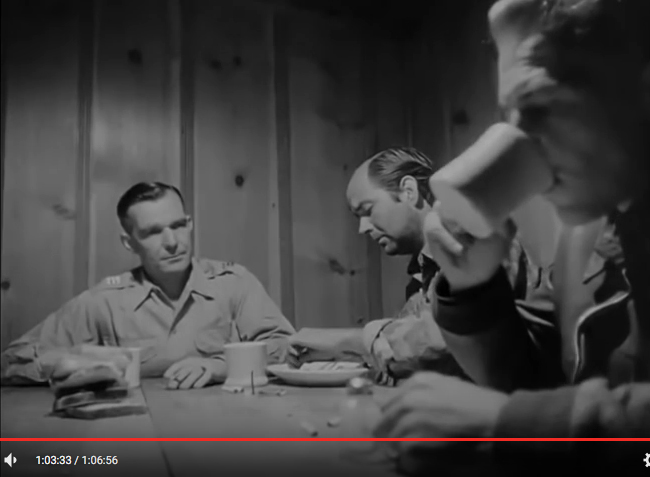
668 Gray. The waters of the river. We hear the waves.
669 LS Through mist we see Corby and Fletcher.
670 MCU Corby lights a cigarette for Fletcher. Lights his own.
FLETCHER:
Do you think he'll come back?
CORBY:
I don't know. I'm not sure yet whether even we've come back. I think we've all travelled too far from our own private boundaries...
671 CU of Fletcher, profile.
CORBY:
...to be certain about these other things anymore. Or come back to ourselves.
672 Fletcher and Corby as in shot 670.
CORBY:
Part of me is glad, but...
FLETCHER:
Yeah. I'm glad in a way too. And I feel free all of a sudden. But somehow I don't want
what I wanted before. I know it's good. There's nothing else I can want. I'm all mixed up. I wish I could want what I wanted before.
CORBY:
Does your head bother you?
FLETCHER: No, it's something else. What's that?
Fletcher touches Corby's shoulder, looking into the mist.
673 The mist.
674 Fletcher and Corby as in shot 672.
675 MS of Sidney crouched on the raft, Mac dead beside him.
SIDNEY: Full fathom five thy father lies;
Of his bones are coral made;
Those are pearls that were his eyes:
Nothing of him that doth fade...
As we hear Sidney speak the above, we hear also Fletcher and Corby.
FLETCHER:
I guess I'm not built for this.
CORBY:
Nobody ever was. It's all a trick we perform when we'd rather not die...immediately.
Come on.
676 The final shot of the film returns to the first, of the forest.
CONCLUSION: THINGS TO NOTE
Ariel's final song. Closing with a return to the beginning
Sidney now is heard singing Ariel's song from The Tempest, which he had paraphrased in story for the woman when she was tied to the tree.
Full fathom five thy father lies;
Of his bones are coral made;
Those are pearls that were his eyes:
Nothing of him that doth fade,
But doth suffer a sea-change
Into something rich and strange.
Sidney's rendition of Ariel's song would have us return to his scene with the woman and a re-evaluation of it. Examination continues in STANLEY KUBRICK'S FEAR AND DESIRE, THE TEMPEST, CHESS AND HAL'S ERROR. In it I principally concern myself with Kubrick's use of Ariel's song, Sidney's error in relating the story of it to the woman, and the chess scene in The Tempest and 2001.
Kubrick closes with a cycling, repetition, the film ending with the same shot upon which it opened. He does the same in Lolita, and in Eyes Wide Shut he closes the film in the toy store in which we see the Magic Circle game featured. We have returned to the beginning. Reset. Continue as before, but expect some changes in perception and comprehension.
HOW THE FILM WAS SOLD AS OPPOSED TO WHAT IT ACTUALLY IS
For anyone expecting a straight out war drama, the 1950s audience was probably confused by what they got. Especially when one considers a rather lurid ad campaign.
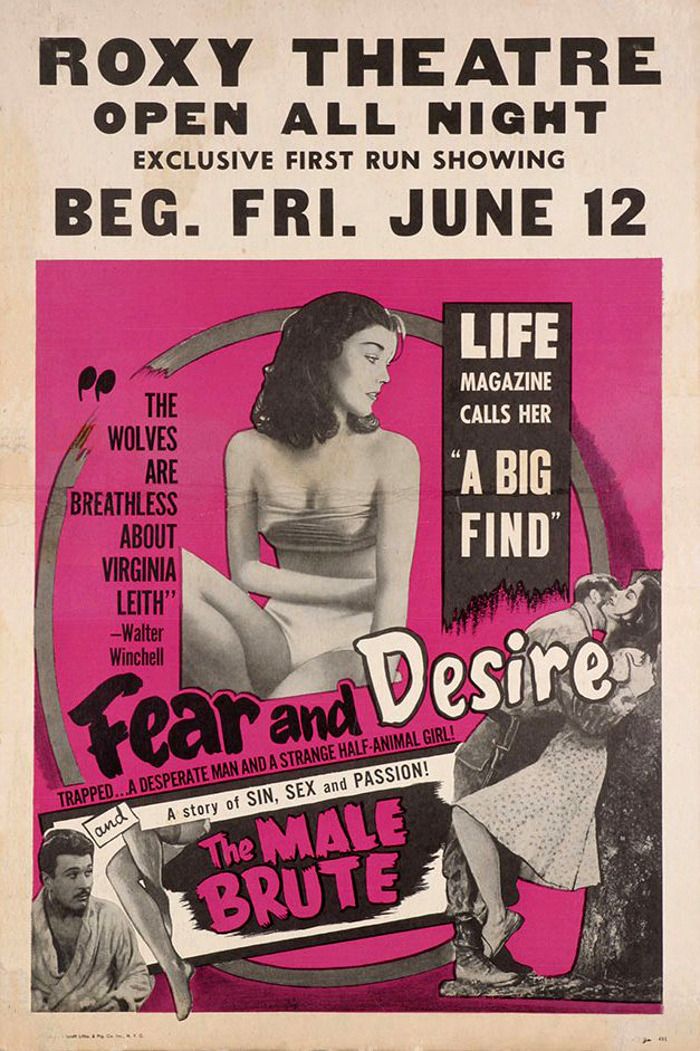
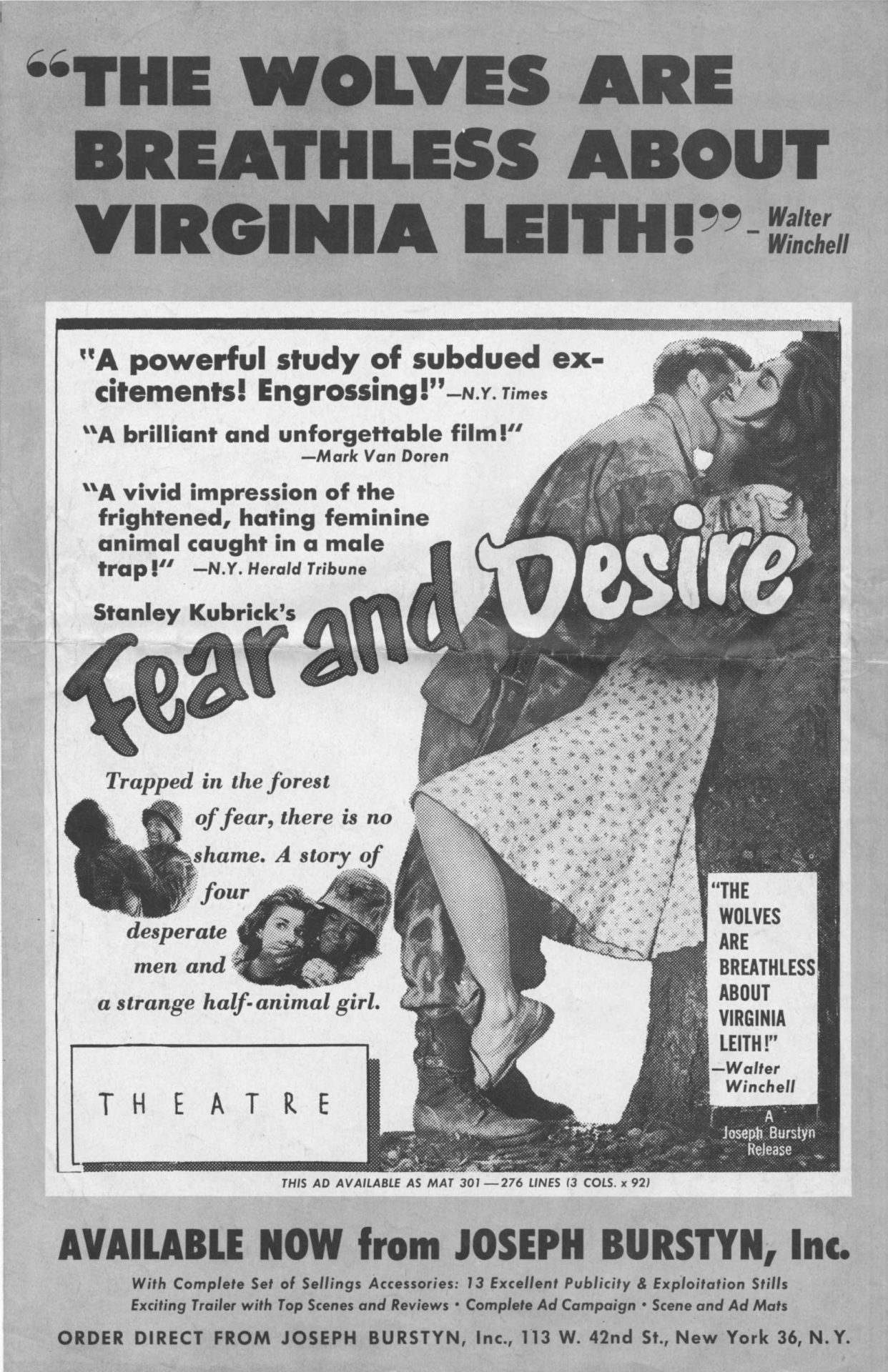
The public is being sold in the ads not even a war film about men trying to escape enemy territory, but the confrontation with a "half-animal" girl in a forest where "there is no shame". The picture of Sidney and the girl, under the Fear and Desire caption, with the girl's ambiguous expression, the man's not shown, makes it appear that she is possibly as caught up in desire as Sidney, despite the review clip from the N.Y. Herald Tribune that states the girl is a "frightened, hating feminine animal caught in a male trap!" Her arms not shown tied behind her around the tree make it appear the embrace is possibly reciprocal rather than forced.
The viewer is also personally targeted with the promise that "wolves are breathless" over the actress, but what hopeful wolves got was a girl always fully clothed in a demure dress, a captive only interested in escape, and there is not a single sexual moment other than Sidney's embracing her and she successfully avoiding Sidney's attempt to kiss her lips as she twists her face away from him.
To me, what marks a difference from how a Hollywood plot might have unfolded is that Sidney's horror of killing has likely garnered the empathy of the audience, yet then he breaks this faith when he pushes himself on the girl. Even the film acknowledges the departure from a normal war picture, joking about how Sidney and the girl will likely fall in love, as if this is what the audience might expect and those expectations would be typically rewarded with an audience-friendly romance. Instead, the viewer of the time will be torn over Sidney, who they have already been prepped to like, and the plight of the captive girl. Sidney's erratic behavior, his bid for affection, leads up to an appearance of his being prepared to rape her, and the actions he makes with the play-within-a-play include choking, which gives her even more reason to fear for her life. Sidney is acting out a bit from The Tempest, but he not only is in error in the story he relates, he makes stabbing and choking motions that have nothing to do with the scene. One has the impression that Sidney, consciously or unconsciously, is partly attempting to relate his experience the night prior and the killings of the three men, though none of them were choked. The problem for the 1950s viewer is that the girl doesn't fall in love with Sidney.The easy way out of a romance between the private and girl would grant the audience a kiss or two, Sidney would plan to help her escape to the "right" side of the border, and she would likely end up killed along the way, but not at the hands of Sidney or his fellows. Instead, likable Sidney, who made friends with the dog, who is sensitive and was horrified by the killings of the soldiers, presses himself relentlessly upon the girl, pleading with her to "like him a little" even if she hates him. And there will likely be members of the audience who will look upon her ruse of responding with affection, in order to get him to untie her so she can escape, as "leading him on". They will think she should instead have responded to Sidney with affection. She should have been understanding. She should have been a healing force for Sidney. She did not give herself to him and therefore she is at fault for forcing Sidney to shoot her. Essentially, the girl is at fault for not granting the audience some tenderness. Of course, to view her in this way is to demand something of her that the audience member, realistically, would not expect to be demanded of themelves, and their sexism is showing, even with women in whom such sexism has been internalized.
Kubrick in nearly every film has ways in which he hoists the audience on its own petard, and quite often this has to do with a closeted sexism and misogyny that might be had in the audience for women. The audience goes in ready for sultry animal-female action in a no-shame forest. The wolves are prepared to be excited. In turn, all they get is the girl attempting to escape and being killed for it.
As far as a war film goes, the audience is notgiven a reason to hate the "enemy" until the end, in as much as preferring one side over the other, except that the protagonists are threatened by the enemy as they are behind enemy lines. The audience is automatically assigned the side of Mac, Corby, Sidney, and Fletcher, and then must examine their intentions and actions as they play out. Those who we consider the good guys, because they are the protagonists, burst in on and kill two soldiers who are eating, then they shoot dead a man who comes in bearing firewood. Sidney panics and kills the girl when she gains her opportunity to flee. At the end, this friendly side kills an enemy war-weary general, and a captain, and escapes, but the cynicism of the general and the captain are such that the audience will feel their initial trust in the protagonists has been confirmed. Still, as there is no background on the war and its cause--that reminds of mid-century warfare but is isolated from it--the enemy is only a matter of whose side one elects to be on.
June 2014 but transferred in March 2016 to this form. Approx 9100 words or 18 single-spaced pages. A 70 minute read at 130 wpm.










